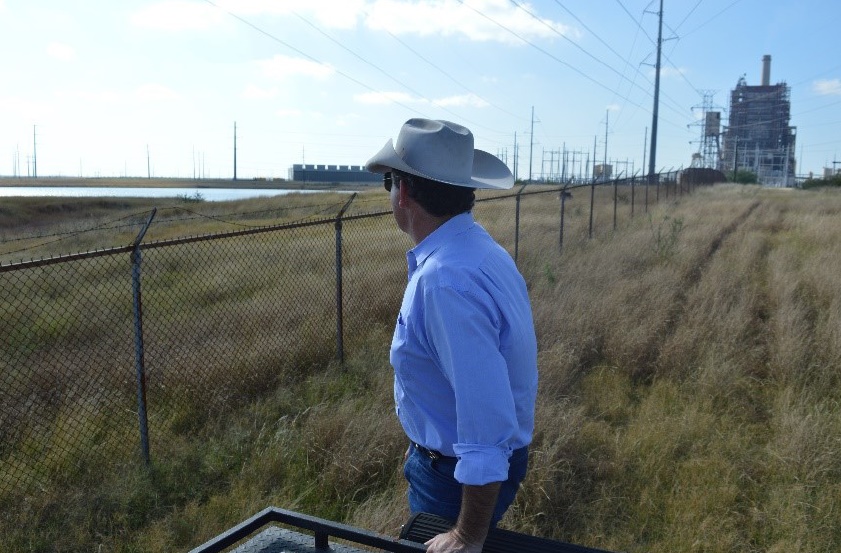(CN) - The dying grass told Jason Peeler something was amiss with sections of his family’s ranch an hour south of San Antonio. He got answers last March, when federal rules forced the operator of a coal-fired power plant in the middle of the family’s land to release its pollution data.

“The groundwater beneath the facility and the Peelers’ ranch is the most contaminated in Texas from any coal plant, according to monitoring data released last year by the San Miguel Electric Co-Op,” states a report issued Thursday by the Environmental Integrity Project.
Peeler, a fourth-generation rancher, said his parents sold 350 acres in the middle of their ranch to San Miguel in 1975 to build a coal-burning power plant. It went online in the early 1980s.
“My parents believed the plant would be good for the community, provide taxes for our schools, jobs for our people and needed electricity for our rural areas,” he said Thursday on a conference call.
The 2015 federal coal ash rule, implemented by the U.S. Environmental Protection Agency under former President Barack Obama, targeted waste ponds that coal plant operators commonly use to dispose of the ash left over from their operations.
According to the report, the ash contains the heavy metals arsenic and chromium and neurotoxins lead and mercury. And because most of the ponds in Texas and the United States are not lined with any barriers, the pollutants are leaking into groundwater, the report states.
Despite a D.C. Circuit ruling last August that said all unlined coal-ash ponds have to be closed, President Donald Trump’s coal-friendly EPA has delayed the closures, Earthjustice senior counsel Lisa Evans said on the conference call.
Evans said interim EPA Administration Andrew Wheeler, a former coal industry lobbyist, has proposed a rollback that would eviscerate water protections and weaken ash-pond cleanup standards.
She gave some perspective that resonated in the football-crazy state.
“Texas often has the dubious distinction of generating more coal ash than any state in the country.Recently it produced more than 13 million tons of toxic ash in a single year. That’s equivalent to burying the Dallas Cowboys football field 1 mile high in ash,” she said.
But the threat to Texans’ health is harder to pin down, Environmental Integrity Project attorney Abel Russ said.
A co-author of the report, Russ said on the phone call he does not know if coal ash has leached into aquifers and contaminated drinking water anywhere in Texas.
“There isn’t any monitoring of neighboring residential wells as far as we know,” he said.
Russ said there’s a major hole in the federal rule: Coal plant operators can “close the ponds in place” by filling them in without removing the water. He said the owners of two coal-fired plants in northeast Texas have acknowledged their ash ponds are in contact with groundwater.
“But they are planning to close them in place any way. This isn’t going to do anything to improve groundwater quality and you are going to see contamination for decades,” he said, adding the environmental groups are trying to protect drinking water now and for future generations.
According to the environmentalists, the EPA has already tied elevated levels of the chemical selenium in three Texas reservoirs to contamination from nearby coal-fired plants.
“Coal ash poisoned water in the reservoirs, caused major fish kills and contaminated fish with high levels of selenium that lasted for over a decade and prompted fish-consumption advisories particularly for children and pregnant women,” Evans said.
Evans said as part of its rollback of the federal rule, the Trump administration is giving states more power to regulate coal ash.
The Texas Commission on Environmental Quality released a preliminary version of state coal ash regulations in August that the environmentalists called “deeply flawed” because it would not timely notify landowners their groundwater had been contaminated, and only let them test their groundwater once a year.
TCEQ spokesman Andrew Keese said the agency does not know when it will finish its coal-ash regulations.
He declined to comment on the report, but said in a statement the Texas Water Code prohibits facilities from contaminating waters in the state, including groundwater.
Peeler, the South Texas rancher, told Courthouse News he’s worried about the implications for his family’s cattle herd, though they have not had any beef from their cattle tested.
“We worry about people not wanting to buy our beef because of it. That’s definitely a concern. So what we did is we pulled off areas we feel are contaminated and are not grazing our cattle there,” he said.
Subscribe to Closing Arguments
Sign up for new weekly newsletter Closing Arguments to get the latest about ongoing trials, major litigation and hot cases and rulings in courthouses around the U.S. and the world.








